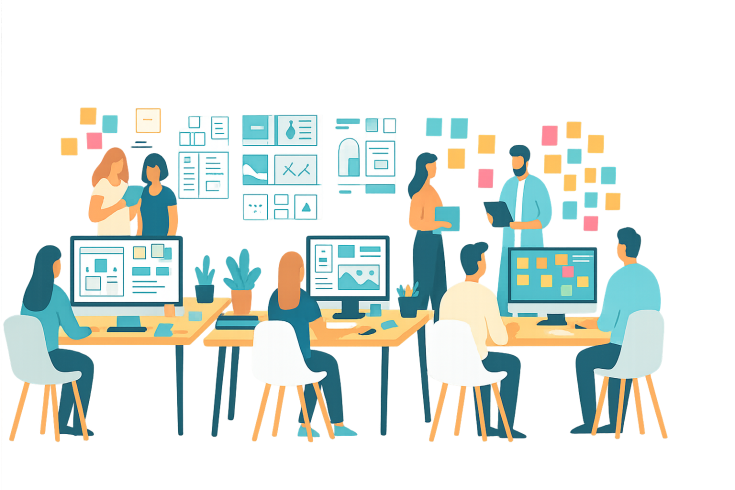Comprehensive CRMs for Businesses: Understanding Goals, Tasks, and Costs

Who Needs CRM? Exploring Its Crucial Role for Modern Businesses

The question of who needs CRM? is more relevant than ever in the fast-paced world of modern business. Whether youre a small startup or a large corporation, understanding the importance of Customer Relationship Management (CRM) software can make a significant difference. Imagine running a business where every customer interaction is tracked, analyzed, and used to improve service and enhance satisfaction. Sounds appealing, right? Let’s delve into how CRM systems can impact various types of businesses.
Small Businesses: Growing with Ease
Small businesses often find themselves juggling numerous responsibilities, from marketing to customer support. For instance, a quaint coffee shop in your neighborhood might start using a simple CRM tool to track customer preferences. When a customer orders their usual vanilla latte, the barista can quickly pull up their profile and ask if they want their preferred pastry too. This personal touch can increase sales and foster loyalty. ⭐
Statistics reveal that CRM systems can lift sales productivity by up to 34%! When a small business implements a CRM, they enhance customer satisfaction, leading to a higher customer retention rate. When you think about it, isn’t it vital for your business too? Who needs CRM? Well, for any local business trying to expand, CRM is indispensable.
Medium-Sized Enterprises: Streamlining Operations
Medium-sized companies face unique challenges as they expand. They need reliable systems to manage customer interactions efficiently. Suppose you run a boutique marketing agency with ten clients. A CRM can help you keep track of each client’s requests, deadlines, and billing in one place. You won’t waste time searching through emails or notes, as everything can be found at the click of a button! ⭐️
In fact, businesses using CRM can improve their marketing ROI by as much as 45%. This shows that CRM is not just a tool; it’s a strategy that aligns your goals with customer needs. Are you ready to take your medium-sized enterprise to the next level? You definitely need a CRM!
Large Corporations: Managing Complexity
For large organizations, CRM is essential to manage complex customer interactions across multiple departments and locations. Consider a global tech firm with thousands of clients and diverse offerings. Using an advanced CRM, they can streamline sales processes, support queries, and marketing campaigns. This unified approach allows them to deliver top-notch service, keeping their competition at bay. ⭐
Studies show that large enterprises see a 25% increase in efficiency after implementing effective CRM solutions. This means more time for innovations and solutions to market needs. Who needs CRM? Any large corporation that aims to succeed tremendously in a competitive landscape.
Non-profit Organizations: Building Relationships
Even non-profit organizations can benefit significantly from CRM solutions. Take for instance a charity organization that manages donations and volunteers. Using CRM, they can track donors contributions, send thank-you notes, and invite them to volunteer events. This personal touch not only helps build trust but also encourages continued support. ⭐
Research indicates that 80% of donors prefer organizations that acknowledge their contributions. By using CRM to communicate effectively, your non-profit can enhance donor relations and boost fundraising results. Who needs CRM? Every organization with a mission to serve the community!
Table: CRM Benefits Across Different Sectors
| Sector | CRM Benefits | Example |
| Small Business | Increased customer retention, personalized service | Coffee Shop tracking customer orders |
| Medium-Sized Enterprises | Improved marketing ROI, streamlined operations | Marketing Agency managing multiple clients |
| Large Corporations | Increased efficiency, enhanced service delivery | Global Tech Firm managing diverse clients |
| Non-Profit Organizations | Improved donor relations, effective communication | Charity tracking contributions and engagement |
How Much Does CRM Cost?
When considering a CRM, many ask, how much does CRM cost? Prices can vary widely depending on the features you need. Typically, you might pay around €50 to €300 per month, depending on the scale and functionalities required. Think of it as an investment; the return can be substantial if done correctly! ⭐
Act Now!
If you’re still wondering whether your business can benefit from CRM, the answer is a resounding yes! Whether you run a small coffee shop, a medium marketing agency, or a large corporation, CRM software can streamline your operations and enhance customer relations. Why wait any longer? ⭐
Contact us today at [email protected] or visit our website at nexrilo.com to discover how CRM solutions can transform your business! Our professional specialists have over 20 years of experience in providing tailored software development solutions, all conveniently available in one place. Don’t miss the opportunity to optimize your operations and boost your success!
Frequently Asked Questions
- What is CRM used for?
CRM is used for managing customer interactions, analyzing data, and improving customer relationships. - Who should implement a CRM system?
Any business that wants to grow and improve customer relations should consider implementing a CRM system. - How long does it take to implement a CRM?
Implementation can take anywhere from a few weeks to a few months, depending on the complexity of your needs. - What features should I look for in a CRM?
Key features include contact management, sales tracking, and reporting tools. - Can a CRM help with email marketing?
Yes, most CRMs offer email marketing tools that integrate directly with customer data. - Is CRM software suitable for startups?
Absolutely! Startups can benefit from CRM by establishing a strong customer relationship from day one. - Are there free CRM options?
Yes, there are several free CRM options available, but they might come with limited features. - Can a CRM improve sales?
Yes, CRM systems help track leads and manage sales, which can significantly improve performance. - Will a CRM help with customer support?
Definitely! CRMs can streamline support tickets and track customer inquiries efficiently. - How do I choose the right CRM for my business?
Evaluate your business needs, budget, and the features offered by different CRM providers before making a decision.
What Is the Goal of CRM? Understanding Its Importance and Benefits

Have you ever wondered what is the goal of CRM? In today’s competitive business landscape, the importance of Customer Relationship Management (CRM) cannot be overstated. At its core, CRM is about understanding customers better and building long-lasting relationships with them. Let’s dive into what a CRM aims to achieve and the multifaceted benefits it offers to businesses.
Enhancing Customer Understanding
One of the primary goals of CRM is to ensure that businesses have a comprehensive understanding of their customers. Imagine walking into your favorite bakery where the staff not only recognizes you but also remembers your preferences. This kind of personalized service is what CRM aims to replicate on a much larger scale. ⭐
Through effective CRM, businesses can gather data about customer behavior, preferences, and purchasing history. This information empowers businesses to tailor their offerings and marketing strategies accordingly. For instance, a clothing retailer that notices a customer frequently purchases athletic wear can send them promotions on new sports gear. Suddenly, your marketing isn’t just random noise; it’s insightful and relevant!
Streamlining Communication
Another key goal of CRM is to streamline communication between the business and its customers. Facilitating seamless interactions at every touchpoint makes customers feel valued and heard. Picture a customer service representative having instant access to a client’s history and previous interactions. They can provide personalized service and resolve issues faster, creating a positive experience. ⭐
In fact, studies show that companies using CRM can increase customer satisfaction ratings by 30%. This statistic illustrates just how impactful efficient communication can be. Are you ready to boost your customer satisfaction? A CRM system could be the answer!
Improving Sales Performance
The goal of CRM also includes enhancing sales performance. With the right tools, sales teams can track leads, manage customer interactions, and forecast sales trends effectively. Let’s in on a little secret: CRM solutions can increase sales productivity by as much as 34%. This means your sales team can focus more on selling and less on administrative tasks. ⭐
Imagine a sales manager reviewing detailed analytics and reports generated by the CRM. They can identify which products are performing well and which ones need a boost. This level of insight helps in crafting targeted sales strategies that drive results. Are you ready to supercharge your sales performance?
Automating Routine Tasks
Automation is one of the most valuable features of a CRM. One of its goals is to automate routine tasks that consume employee time, allowing them to focus on higher-value activities. For instance, CRM systems can automatically send follow-up emails to clients or reminders for meetings. This means no more missed appointments or forgotten emails! ⭐
Research indicates that over 25% of time is wasted on repetitive tasks. This can lead to burnout and decreased productivity among employees. A CRM can alleviate this burden and enable your team to concentrate on what they do best: creating great customer experiences.
Table: Key Goals of CRM and Their Benefits
| Goal | Benefit |
| Enhance Customer Understanding | Tailored marketing strategies |
| Streamline Communication | Improved customer satisfaction |
| Improve Sales Performance | Boosted sales productivity |
| Automate Routine Tasks | Increased employee efficiency |
What Tasks Does CRM Solve?
You might now be asking, what tasks does CRM solve? The answer is a plethora! From managing contact lists to tracking customer interactions and analyzing purchasing trends, CRM systems handle multiple aspects of customer management. They act as a centralized hub for all customer-related information. ⭐
For example, a travel agency can use CRM to store customer details, track bookings, and send personalized travel recommendations based on past trips. The beauty of this approach is that it not only saves time but also enhances the overall customer experience.
Ready to Transform Your Business?
Understanding the goal of CRM is essential for any business looking to thrive in todays market. Whether it’s about building stronger customer relationships, improving your sales processes, or automating everyday tasks, CRM systems can provide the tools you need for success. ⭐
Dont wait to revolutionize your customer engagement! Call us at [email protected] or visit nexrilo.com today to find out how our CRM solutions can fit your business needs. With over 20 years of experience, our team of professional specialists is ready to help you achieve outstanding results!
Frequently Asked Questions
- What is a CRM system used for?
A CRM system is used for managing customer relationships, sales tracking, and marketing automation. - How can CRM improve my business?
CRM can enhance customer satisfaction, increase sales productivity, and streamline communication. - Is CRM suitable for small businesses?
Absolutely! Small businesses can greatly benefit from CRM by improving customer relationships and operational efficiency. - What features should I look for in a CRM?
Look for features like contact management, sales tracking, email integration, and analytics. - Can CRM help with customer service?
Yes! CRM systems can improve customer service by providing support teams with the necessary customer data. - What is the average cost of a CRM system?
The cost typically ranges from €50 to €300 per month, depending on the features and scale you require. - Can CRM systems integrate with other software?
Most modern CRM systems can integrate seamlessly with various tools like email, calendars, and project management software. - Is training necessary for using a CRM?
While user-friendly, some initial training can help employees maximize the tool’s potential. - Can I customize CRM solutions for my needs?
Yes! Many CRM platforms offer customization options to fit your specific business needs and workflow. - How long does it take to see results from CRM?
Results can vary, but you might start seeing improvements in customer satisfaction and sales rates within a few months of use.
Fill out the form below and our team will reach out within one business day
